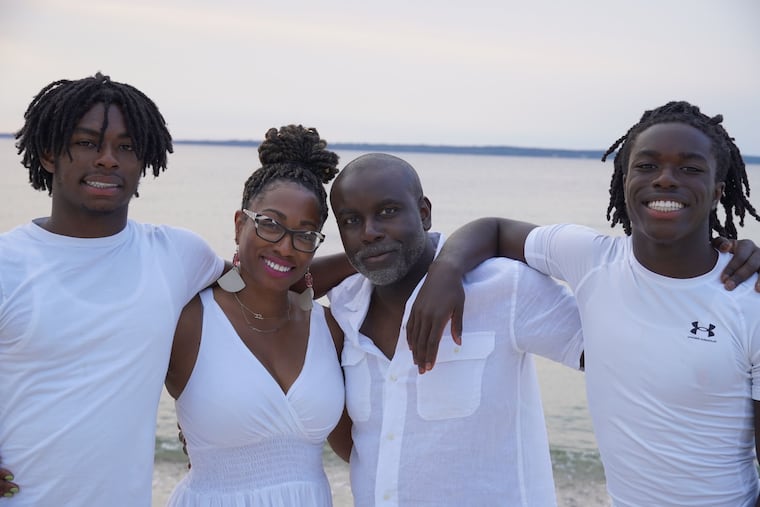On Haitian Independence Day, honoring our heritage, our community, and the future we are building together
Philadelphia and its revolutionary spirit provide the perfect backdrop for raising Haitian American sons.

As we prepare to celebrate Haitian Independence Day on Jan. 1, my thoughts turn to the intersection of heritage and legacy — to what it means to raise Haitian American sons in Philadelphia, a city rich with its own revolutionary history. This is a story of love, resilience, and a deep commitment to understanding our past as we move forward together as a family.
I have been privileged to work in youth development for more than 25 years, and currently serve as a director at Children’s Hospital of Philadelphia’s Center for Parent and Teen Communication. My work focuses on helping families thrive through stronger connections, communication, and empathy. But beyond my professional title, I am a father and husband, roles that have taught me the profound weight and beauty of legacy. My wife, my Philly jawn, is African American — a powerhouse of love and wisdom who is my partner in raising two Haitian American young men who reflect the best of both of us.
Haitian Independence Day is more than an acknowledgment of the historic moment in 1804 when Haiti became the first free Black republic in the world. It is a celebration of liberation and revolution — concepts that are complex, layered, and, in many ways, unfinished. I like to think of liberation as a process that is still on pause mode, urging us to revisit the past with discernment, not just relying on old information but asking new questions: What does liberation mean in 2024? What does it look like in my household, where I strive to instill pride, humility, and critical thinking in my sons?
Haiti’s legacy of resilience is deeply personal to me. My mother, a retired nurse, and my father, a retired doctor and a proud Pan-Africanist, taught me that liberation is both collective and individual. They embodied the spirit of Haiti — an island of 10 million people whose diaspora has created vibrant communities in Florida, New York, Massachusetts, and here in Philadelphia. Their lessons guide me as I raise my boys to carry the strength of their ancestors while navigating the challenges of growing up in America.
In our home, our heritage isn’t just history, it’s a living, breathing force. We lean on the famous and the familial, celebrating the triumphs of Toussaint Louverture and Jean-Jacques Dessalines while honoring the everyday resilience of those who came before us. Our conversations are grounded in love, but also in the need to discern — to sift through the noise and use good information to make sense of our world. This is particularly important now, in a time when misinformation and historical erasure threaten to distort the narratives we pass down to our children.
As a father, I see my role as both a protector and a guide. I want my sons to walk with humility, to understand their strength comes not from dominance but from the courage to stand firm in their values.
» READ MORE: How Haitian immigrants and local Black resistance helped subvert slavery in 18th-century Philadelphia | Opinion
I am learning about us — about the ways our Haitian heritage intertwines with the African American experience, creating a unique blend of cultural richness that shapes who we are as a family. This learning is not a destination but a journey, one that requires revisiting the past, asking hard questions, and gaining a deeper understanding of our collective story.
Food is one way we connect to our heritage. On Jan. 1, our family will gather around a table to share soup joumou, the traditional pumpkin soup that symbolizes freedom and unity. For Haitians, soup joumou is more than a meal, it’s a reminder of what our ancestors fought for and a celebration of the strength it takes to rebuild and reclaim. As we eat our soup, we share stories of their grandparents and great-grandparents, of the sacrifices they made and the dreams they carried.
Philadelphia and its revolutionary spirit provide the perfect backdrop for raising Haitian American sons.
This city has taught them about resilience — not just through its history but through its people. My boys see this resilience in their mother, in their community, and in the many mentors and friends who surround them. They are learning to navigate their dual identities with pride and purpose, drawing strength from the best of both worlds.
Haitian Independence Day is a time for celebration, but it is also a reminder that liberation is complex. It is about more than breaking free; it is about building up. It requires love, humility, and a commitment to understanding ourselves and each other. As we move forward as a family, I hold onto the hope that my sons will carry this spirit of liberation into their own lives, becoming leaders and healers in whatever paths they choose.
In many ways, our journey as a family mirrors Haiti’s journey as a nation. We are navigating challenges, celebrating victories, and continuously striving to honor the legacy of those who came before us. This is about love — love for our heritage, for our community, and for the future we are building together. It is a love that liberates, a love that unites, and a love that endures.
Jacques Louis is a proud HBCU dad and a parenting advocate at CHOP’s Center for Parent and Teen Communication.